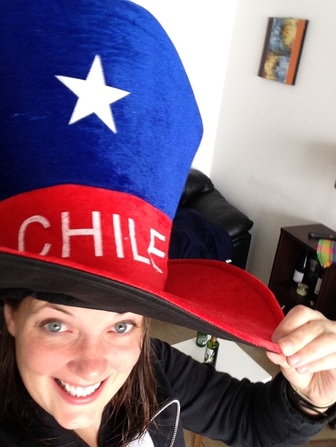When I left Iquique after two years to relocate to Santiago, I was particularly sad about leaving them behind. Not only had they been dear friends, confidants, Chilean history lesson providers, and cooking instructors, but they had also opened their home to me several times when I either physically needed a place to stay, or was so emotionally wraught from fieldwork that I needed an escape. But within a few months, Guillermo, originally from Santiago, had secured a position in the central office of the Consulario, and Cristian was interviewing for jobs in the metropolitan region as well. By summer we were reunited.
And while I had been indeed the gringa in Iquique—even more-so in the marginal satellite city of Alto Hospicio where I had lived and done my research, suddenly in Santiago I easily passed as someone who “belonged.” Perhaps at first glance it was clear I was not Chilean, and certainly confirmed when I began to speak with my muddled accent, and overly forced slang. But there were so many of us foreigners around that I was finally breathing sighs of relief that I was unremarkable. Here, gringa made less sense, but the nickname persisted. While I had always taken it as a term of endearment, it was questioned more in Santiago. “Aren’t you offended?” my Colombian apartment-mate would ask. But slowly he began calling me “gringa” as well. As did my boss, who had also become something of a friend. I heard “oye, Gringa” dozens of times each day, and received social media messages and emails addressed as such in addition.
And then my time in Chile ended. Before taking that long flight back to Chicago, I went to visit Bolivia, the place of my Ph.D. fieldwork, and suddenly I went back to being Nelly, or “la doctora.” My friend Gustavo and I went from La Paz to visit Cochabamba for a weekend, and we met up with a large group of friends, most of whom I had known several years earlier in La Paz. But there were some newcomers, a group of young people from Santiago who were visiting as well. As we all paraded around a Cochabamba supermarket contemplating what to grill that Saturday afternoon, I heard a Chilean accented voice shout, “Oye, Gringa!” I instinctively looked up, only seconds later wondering how this man knew I would respond to that name. Is it just that Chileans all call people gringos? Am I so very obviously Estadounidense that calling me anything else doesn’t seem to be an option, at least to someone who does not remember my name? And as I looked around for the voice’s owner, contemplating these possibilities, I realized he was not speaking to me, but to the Argentine women who was traveling with them.
Over the course of the weekend I never learned the Argentine’s given name, because she was exclusively referred to as Gringa. She was tall and had half of her hair died blonde. The other half of her head was shaven to buzz cut. She had a deep laugh and bright colored Adidas high top shoes that complimented her day-glow t shirt. I could easily imagine her as the stereotypical Argentine traveler juggling small balls or doing gymnastics at a traffic light in another South American country. And the name that had for so long felt so singularly mine, suddenly felt cheapened. If any foreigner could be a gringa, just because her skin was light, maybe it wasn’t a term of endearment. I never questioned Guillermo and Cristian’s motives, but somehow that word no longer felt like home.
Mary Weismantel writes, “Foreigners—a category that includes Latin American visitors as well—are gringos, but they are members of the same race as local whites.” Gringa will always be special to me, even as I write about the politics of whiteness in places like Iquique, La Paz, and Santiago. But I also must remember, it is not just a name, but a positionality, and its meaning…like chola, indian, indigenous person, black, person of color, or any other racialized naming form…is always historically, contextually, and politically dependent.

 RSS Feed
RSS Feed
